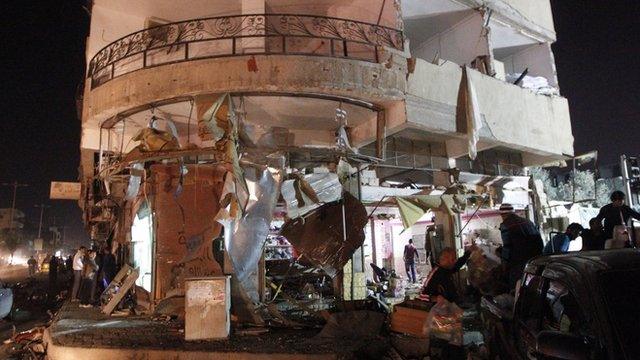Europe could feel the backlash from jihadist conflicts
- Published

It's estimated that there are currently up to 2,000 militia groups in Syria
This week Britain's House of Commons was told that a terrorist attack in Europe by jihadist fighters returning from Syria is "almost inevitable but may not happen for some time".
The warning came from a leading terrorism expert and author on al-Qaeda, Dr Thomas Hegghammer from the Norwegian Defence Research Establishment.
He told a House of Commons seminar that at least 1,200 volunteers had now departed from various European countries to join extremist groups fighting in Syria.
For some time now counter-terrorism officials here have been on the lookout for what they call "blowback" - returning fighters getting involved in militancy back home, if they survive the battlefield.
A senior Whitehall official told the BBC: "We operate on the basis that terrorist groups in Syria have the intent to attack us. Their strategic direction is an important factor but individuals can also have their own reasons for wanting to plan an attack."
To many, this will sound needlessly alarmist. When US and other Western forces were in Iraq between 2003-2010, European government officials frequently warned of the dangers of blowback from that conflict.
Yet despite incidents of related terrorism inspired by the Iraq war, like the 2007 Glasgow airport attack when an Iraqi doctor working in the UK drove a burning jeep with canisters into the airport, the threatened blowback phenomenon of dangerous returning militants never really materialised.
But with the Syrian conflict now approaching its fourth year and the death toll passing 100,000, attention is focusing on what the long-term risks are to the rest of the world.
Unrealised fears
Extensive studies have been carried out by Dr Hegghammer and the London-based International Centre for the Study of Radicalisation and Political Violence (ICSR) as well as by others.

There is no prospect of an end in sight to the fighting in Syria
Between 200-400 fighters - each from Britain, France and Germany - are thought to have gone to Syria, with the highest proportion per capita leaving from Bosnia.
Dr Hegghammer said that, historically, one in nine volunteers who went overseas to fight then returned and became involved with militant groups.
But he added there was usually a time lag of some years between the start of a conflict and a blowback attack back home becoming a reality - four years in the case of Afghanistan, three years in the case of Yemen.
Most jihadists leave home with no intention of returning, hoping to die a martyr's death for what they see as a holy cause.
One British fighter who was contacted in Syria recently by Skype from his family home in Portsmouth said Britain's security service "did not need to worry about him" as he was not planning on returning.
While the fighting in Syria rages, that will probably remain the norm.
Available government estimates of FFs (Foreign Fighters) in Syria
Source: Norwegian Defence Research Establishment
Secret pact
To date, no one has yet been convicted in Britain of a Syria-related terrorism offence.
But with no side emerging there as the clear winner, and with no prospect of an end in sight, Syria has become home to an estimated 1,600-2,000 fighting groups, of which the largest and most powerful anti-government bodies are the jihadist Jabhat al-Nusra (JAN) and Islamic State in Iraq and the Levant (ISIS).
Both have links to al-Qaeda.
Many jihadists in Syria believe that the West's reluctance to get drawn into the fight against the regime of President Bashar al-Assad is part of some secret pact with the regime to keep him in power.
A Western counter-terrorism official warned this week: "Our worry is that they (the extremist groups in Syria) will switch their attention to Europe.
"Our concern is anyone who comes back with training and experience and then starts up a militant network, perhaps with links back to al-Qaeda in Syria. Or they could simply be very psychologically damaged from what they have seen".

One of the largest anti-government groups, Jabhat al-Nusra, has asserted its dominance in Syria
Blowback to Europe from conflict arenas is not inevitable everywhere.
Dr Hegghammer points out that while there have been many instances of it from Afghanistan and Pakistan there have been very few from Somalia, a battlefield from which most European volunteer fighters never return.
But he offers this grim prognosis: "Syria will prolong the problem of jihadi terrorism in Europe by 20 years. Probably more jihadists have gone there than to all the other previous destinations combined.
"Even if the blowback rate is very low, so many people are going there to fight that the absolute number of (eventual) attacks will be substantial."
- Published15 October 2013
- Published20 August 2013
- Published23 January 2013